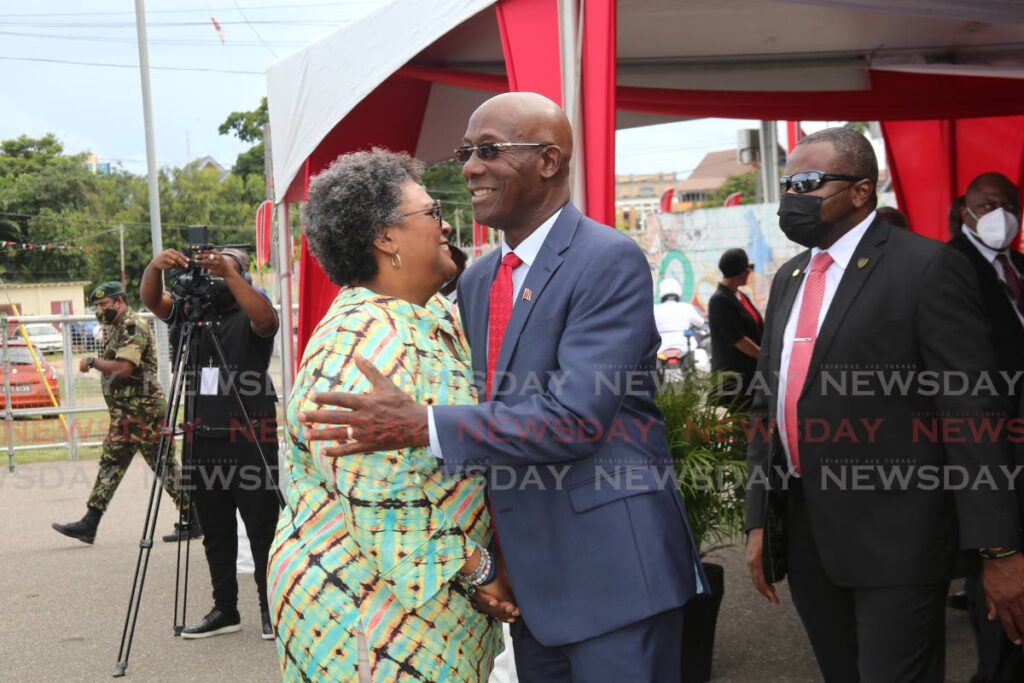Mottley, Rowley on planting peas in Tobago

ALTHOUGH Heads of Caricom states gathered on Friday at the second Agri Investment Forum and Expo, at the National Academy of Performing Arts, Port of Spain, to focus on the very serious issue of food security, the event still had several moments of levity.
One came in the form of an exchange between Barbados Prime Minister Mia Mottley and TT’s Prime Minister as she called on people to begin planting peas in Tobago.
“Not even a bassman in our head should stop us from planting peas in Tobago,” she said to loud applause, in obvious reference to Shadow’s classic calypso Bassman.
She urged people to begin planting short-term crops and raising fast-growing livestock, and to begin eating what is grown in the region, not only because of the financial implications, but because of health as well.
She also called for a regional calorie counter for local and regional dishes.
“How much calories are going to be in the roti you going to serve me later Keith?” Mottley asked.
“How much calories are there in breadfruit? How much calories are there in the ingredients in the corn soup?”
But Dr Rowley, in his address, responded to Mottley’s call to plant peas citing his personal woes in planting the crop.
“You go and plant peas in Tobago and see what happens to you,” he said.
“I planted peas in Tobago. Cocrico ate all. And if I touched a cocrico is straight to jail I going, because it is a protected species.
“They used to live in the forest and would come down from the forest and were considered a delicacy. But from the time they heard they were a protected species, they came out. They would be in the yard fighting fowl.
“From my peas farm, they ate everything. As soon as it began to flower they would eat.
“When we spoke about reducing the population, you heard the screams of the environmentalists that we couldn’t touch the national bird. In Tobago, we call it the national pest.”
Caricom leaders: be part of the solution
Caricom leaders called for all relevant stakeholders to get on board with the regional push to reduce its billion dollar food import bill by 25 per cent, by the year 2025.
Rowley and Mottley, as well as Guyana President Dr Mohamed Irfaan Ali and Surinam President Chandrikapersad Santokhi, echoed similar sentiments – that in order for the region to sustain itself, in the face of shocks and changes in the world, the region must once again learn to feed itself.
“We have the confluence of three global crises,” Mottley said.
“We are at war with climate, we are at war with pandemics – not just covid19 but the anti-microbial resistance pandemic, and we are at war with inflation as a result of being at war with war.”
Mottley said that the region’s plans can not only be medium term as the region’s population is already feeling the negative consequences of climate change, war, disease and inflation. She said the region has fed itself before and can do it again.
“None of us can avoid the reality that our people must eat. There are things that we can do and that we have done in our past, to ensure survival. We are there again.”
Santokhi, adding to the call for a collective response against crises affecting the region’s ability to feed itself, suggested that countries invest in greenhouses.
“Investing in greenhouses has several advantages. It protects crops against infestation and enables farmers to deal efficiently with scarce resources.
Rowley called on the private sector not to be resistant to the developments coming out of the regional food-import reduction drive, which may disrupt the current status quo, but to get on board and distribute and invest in local produce.
“Food takes time to grow, animals take time to grow. Take that time to change the formulae of trade. If we are to feed ourselves with local producers, get on board with the local producers. Invest your time, finance, expertise in your business and be part of the solution and not the problem.”
Ali lauded Republic Bank for taking the lead in assisting Caricom’s food-import reduction initiative, saying there are seven different proposals for initiatives to move Caricom’s plans forward.
“Those proposals are now with Republic Bank and we are now pushing for it to approve those proposals to advance financing of our projects.”
The Agri Investment Forum and Expo, being held at the Queen’s Park Savannah, started on Friday and ends on Sunday.
It aims to strengthen the linkages along the food value and distribution chains in order to make locally and regionally produced food more affordable and attractive. The expo hosts over 300 exhibitors from various sectors along the food value chain including agricultural machinery, agro business and processing.


Comments
"Mottley, Rowley on planting peas in Tobago"